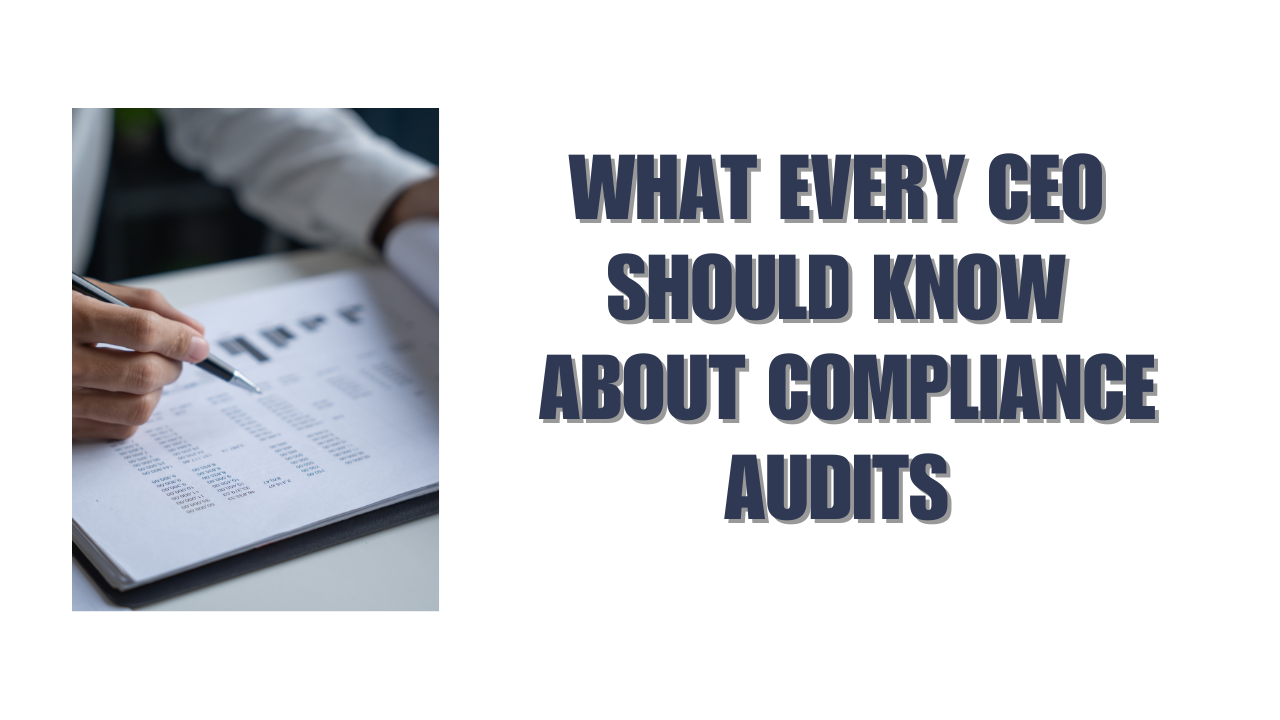For today’s CEOs, leading a company is no longer just about driving profits and market share. The modern business environment demands an additional layer of responsibility ensuring compliance with a growing web of regulations, standards, and stakeholder expectations. At the heart of this responsibility lies one crucial tool: compliance audits.
These audits are more than a regulatory box to tick. They are strategic safeguards that protect your organization from legal risks, reputational damage, and operational inefficiencies. For CEOs, understanding their role and impact is no longer optional-it’s a leadership necessity.
Why Compliance Audits Matter at the Top
Compliance failures are costly. Regulatory fines, investor mistrust, and public backlash can cripple even the strongest companies. In fact, recent studies have shown that organizations facing compliance breaches suffer financial penalties and long-term reputational damage that reduces their market value.
For CEOs, the implications are clear: ignoring compliance is a business risk. Compliance audits provide assurance that your company is meeting required standards while also uncovering gaps that could escalate into larger problems.
The CEO’s Lens: Compliance as a Strategic Asset
CEOs often perceive audits as burdensome exercises driven by regulators or legal teams. But approached correctly, compliance audits deliver strategic advantages:
1. Risk Mitigation at the Executive Level
Every CEO knows risk management is central to business survival. Audits identify non-compliance risks in areas like data privacy, labor laws, financial reporting, and environmental standards-before they evolve into damaging crises.
2. Strengthening Stakeholder Confidence
Investors, boards, and customers expect transparency. A clean compliance audit demonstrates your commitment to governance, building confidence that your leadership prioritizes accountability.
3. Operational Efficiency Gains
Audits often reveal inefficiencies in processes or outdated practices. By addressing these findings, companies can reduce waste, streamline workflows, and enhance productivity.
4. Protecting Reputation in the Marketplace
In a world where brand reputation is as valuable as capital, compliance failures can erase years of trust overnight. Proactive audits help maintain credibility in highly competitive industries.
Common Compliance Challenges CEOs Should Anticipate
Compliance requirements are vast and ever-changing. For CEOs, anticipating challenges allows for better preparation:
- Evolving Regulations: From data protection laws like GDPR to sustainability mandates, rules are constantly updated. Falling behind creates compliance gaps.
- Global Expansion Risks: Operating across multiple jurisdictions brings conflicting or overlapping regulations that can overwhelm internal teams.
- Complex Supply Chains: Vendors, contractors, and partners can expose your company to risks if their practices don’t meet compliance standards.
- Internal Resistance: Employees may view compliance as a burden, leading to incomplete reporting or resistance to change.
These challenges highlight why compliance audits are ongoing safeguards.
Best Practices for CEOs to Drive Audit Success
To leverage compliance audits effectively, CEOs should focus on embedding them within the organization’s leadership agenda. Some best practices include:
1. Champion a Culture of Compliance
Tone at the top matters. When CEOs emphasize the importance of compliance, it cascades throughout the company. Employees follow the leadership example, reducing resistance to audits.
2. Adopt Risk-Based Audit Planning
Not all areas carry equal risk. CEOs should ensure audits prioritize high-risk functions-such as finance, IT, and procurement-while balancing resources across the organization.
3. Leverage Technology and Analytics
Modern audit tools can review entire datasets, flagging anomalies that traditional sampling might miss. CEOs who support digital audit transformation benefit from more accurate, efficient results.
4. Ensure Independence and Oversight
Internal auditors must operate independently of the processes they review. CEOs should back their authority and ensure they report directly to the board or audit committee.
5. Act on Findings Promptly
Audit reports are valuable only if recommendations are implemented. CEOs should insist on timely follow-up to address gaps and track progress.
Lessons From Compliance Failures
History offers sobering reminders of what happens when compliance is ignored:
- Data Privacy Breaches: Several global companies have faced multimillion-dollar fines for failing to comply with data protection laws. In many cases, audits could have detected vulnerabilities earlier.
- Financial Misreporting: Non-compliance in financial disclosures has led to SEC investigations, stock value drops, and criminal charges for executives.
- Supply Chain Misconduct: Firms sourcing from non-compliant vendors have faced reputational backlash for labor violations, forcing costly public relations recoveries.
These cases illustrate that CEOs cannot afford to view compliance as someone else’s responsibility. It directly impacts leadership credibility and business continuity.
How Compliance Audits Create Long-Term Value
Far from being defensive exercises, audits create long-term value when CEOs integrate them into strategic planning. They:
- Strengthen decision-making with reliable data.
- Reduce costs by uncovering inefficiencies.
- Enhance competitiveness by demonstrating governance leadership.
- Position the company as a trusted partner for investors, regulators, and customers.
In many industries, companies with strong compliance track records gain preferential treatment from regulators and outperform competitors who lag behind.
CEO Action Checklist: Building Audit-Ready Organizations
- Establish a clear compliance framework aligned with regulations and industry standards.
- Invest in training programs so employees understand their role in maintaining compliance.
- Develop a transparent reporting system where issues can be raised without fear of retaliation.
- Integrate compliance into strategic goals, not just operational tasks.
- Monitor audit outcomes continuously to ensure improvements are sustained.
By making compliance part of the leadership agenda, CEOs create resilient organizations capable of adapting to evolving risks.
Conclusion
For CEOs, compliance is not simply a legal checkbox-it is a strategic imperative. Compliance audits act as both a protective shield and a performance enabler, safeguarding reputation, improving efficiency, and enhancing stakeholder trust.
At Aurora Financials, we specialize in helping businesses navigate complex compliance landscapes with confidence. Our audit expertise ensures risks are identified early, controls are strengthened, and organizations are prepared for sustainable growth.
When compliance is embedded into the DNA of leadership, audits stop being a burden-and instead become a competitive advantage.






